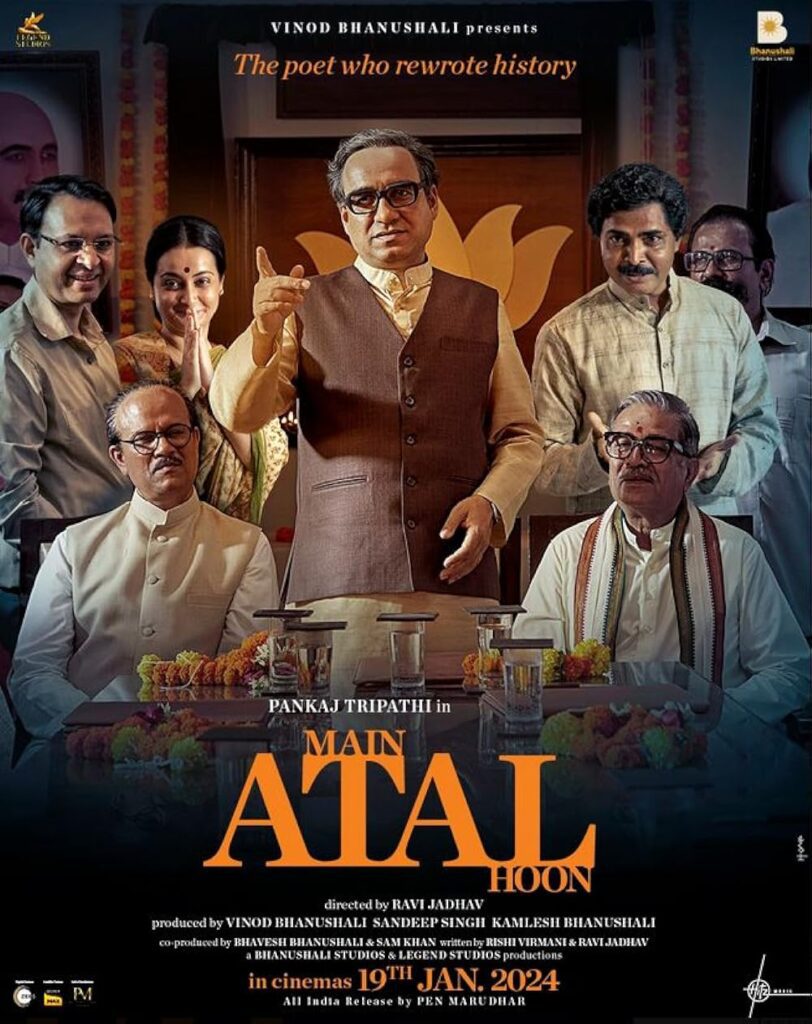Main Atal Hoon
Introduction
It was the year 2003 when the Indian Cricket Team was about to visit Pakistan for the first time since the ’99 war when the then Indian Captain Sourav Ganguly had visited our then Prime Minister Atal Bihari Vajpayee. It was at that point that the latter(having fought all odds to schedule the ‘Friendship’ Tour) had said ‘Match Jeeto Na Jeeto, Dil Jeet kar Aana'(You may or may not win matches but win hearts and come back). This single line spoke volumes of the personality of a politician who was still a poet by heart and wished for peace and friendship, a quality adored by even the Opposition then. So when I did get to know about the biopic of Atal Bihari Vajpayee, I was quite looking forward to it despite the fact that I had an inkling that the biopic in itself might be fragmented to a point wherein it would shift from one event to another in the life of one of the better leaders that we have had in our country. Main Atal Hoon did promise to deliver atleast from the trailer that was cut which made me curious to watch the film further. With Pankaj Tripathi at the helm of it and Ravi Jadhav directing it, the film had all the ingredients to be a rousing biopic. So then, does Main Atal Hoon manage to impress, let’s find out.
Story & Screenplay
Main Atal Hoon is a biopic on the life of Atal Bihari Vajpayee, a name in Indian politics that is still discussed with as much passion and admiration given his contribution to the nation. But sadly so, the story here is designed to be a preachy stage play that absolutely misses the mark while swiftly going on from one event to another. As a result, the story in itself did not give me crucial insights into the character of Atal ji outside of what I have already known him to be. Also since this wasn’t based on a book, this was more of the perception of what Atal-ji may have been as a person as opposed to a factual evidence of the traits that really hampers the narrative from a storytelling stand point. The screenplay standing at a whopping length of almost 140 minutes tries to cram in maximum events in his life while never really steadying on any particular incident which would have been a better proposition at being emotionally invested.
The drama begins with the introduction of Atal Bihari Vajpayee, as he finds himself in a tricky position of whether to opt for war against Pakistan or not during his Prime Ministerial tenure. The film soon jumps timelines to the past wherein a young protagonist is shownnto be afraid of speaking in front of a young crowd. In an endearing scene, his father explains to him the qualities that he has while giving him the confidence of speaking fearlessly in public, a trait that was well received by the protagonist(and something that stuck on as well). But this period is short lived, as the writers quickly move past it wherein you see a now grownup protagonist actively taking part in the fight for Independence in Pre-Independent India. The issue is exactly that, of not sticking to a particular event and moving to the next one even before the viewer is invested in the same.
The proceedings are preachy particularly in the first hour wherein you are subjected to multiple speeches, either during the student political era of the protagonist(the love story here was soft and refreshing) or in the actual political space in the capacity of the opposition. The problem was that in doing so, you missed out on the personal trait of the individual and his love for poetry, that is almost used as a passing reference. If you remember in the film 12th Fail, the poetry that the character of Vikrant Massey narrates was actually of Atal Bihari Vajpayee but it created a moment of grit so beautifully. That same poetry could so easily have been used here, perhaps even at regular junctures, to create endearing moments along the way. But the focus was a tad too much on politics which would still have been alright if the picture was provided from both sides of the spectrum. Instead, the narrative was heavily tilted on one-side that reeked the stench of the propoganda of a political party instead of focusing on the protagonist and his contributions towards the nation. Even the complex nature of character dynamics was just not tapped into.
Things get slightly better in the second hour but this is just a relative metric given that the writers were just not interested in allowing any event to breath. Even some major events from the 90s(which made for a familiar viewing), wasn’t quite allowed to truly blossom, politically or otherwise, as I slowly found myself detached from the drama. It was only briefly during the final act that I stood up and took notice of an amazing parliamentary speech by Pankaj Tripathi, replicating the famous speech of Atal ji that holds significance even today. But on either side of that, the writing remained lacklustre and fragmented.
Dialogues, Music & Direction
The dialogues are quite heavy and preachy instead of being subtle and nuanced like Atal-ji’s poetry, that ultimately did not create the required impact for me. The music is quite good and the melodies do enhance the emotions at certain places. The BGM is alright but it doesn’t quite peak the drama at any given point of time. The cinematography is decent but it kind of gets monotonous with the frames capturing the multiple speeches. The editing was decent too but it lacked the stillness that would have ideally translated in the emotional quotient of the drama. Director Ravi Jadhav is a good director but he has missed the mark here. Biopics are never easy to execute given that there is always an indecision on how much to pack in, and how much to brush aside. And that is what the director misses out on – the soul of the protagonist. The biopic is reduced to a timeline that lacks an emotional quotient that the director fails to tap into.
Performances
The performances are essentially summed up in single towering act by Pankaj Tripathi. This also means that actors around him aren’t utilized enough. Veterans like Dayashankar Pandey, Pramod Pathak and Piyush Mishra do not get enough screen time to blossom in their respective roles. Ekta Kaul is the lone shining star from the supporting cast, and she does a swell job. But it is Pankaj Tripathi in yet another incredible performance that truly lends a great hand in exploring the nuances of the character. Had the writing been a little more supportive, this would honestly have been a memorable outing. But nevertheless, a well restrained Pankaj Tripathi might be a good reason to watch the film.
Conclusion
Main Atal Hoon is a lacklustre and fragmented biopic on an individual who was adored even by the opposition. Sadly, the writing misses the emotional quotient while just contributing to the timeline of the protagonist. Atal Bihari Vajpayee deserved a better biopic, this one is just plain average. Available in a theatre near you.




